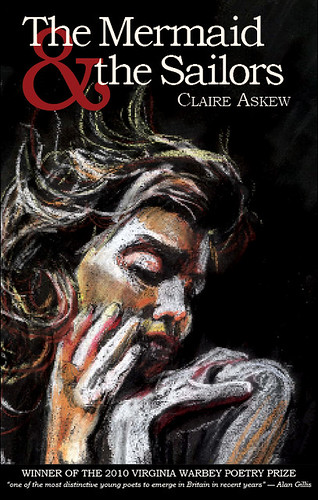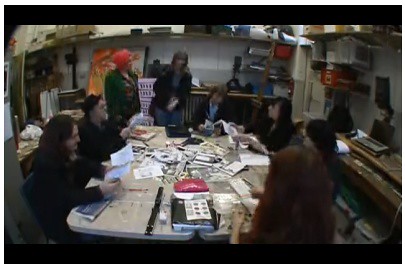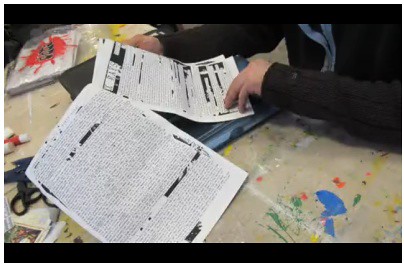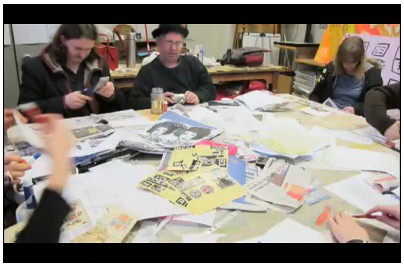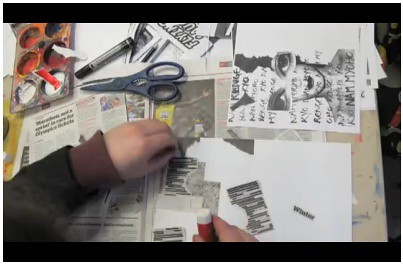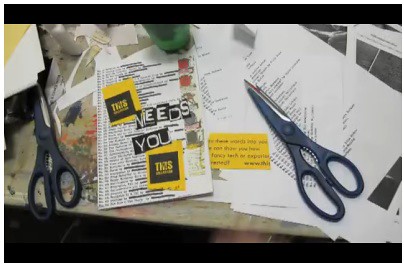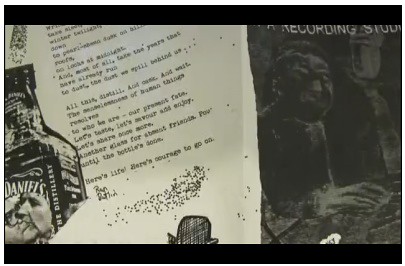
If you’ve spent any time at all at this blog, you will know I am a super-massive Allen Ginsberg fan. I first discovered the great man’s work in my third year as an undergrad English Lit student (I know, it took me long enough), and within months had voraciously read enough of his poetry to know that this was what I wanted to write my undergraduate dissertation about. After much deliberation, I decided to focus on the ‘Howl’ obscenity trial, and its still-ongoing repurcussions — at the time, there was much talk of whether or not ‘Howl’ was “a useful text”. My essay discussed whether or not it was, in fact, useful back in 1956, and more importantly, whether or not, and in what ways, it could be seen as useful now.
I was unfortunately limited to a paltry 6,000 words for my undergraduate dissertation — the shortest word limit for such a piece of work that I have ever heard of, in fact. But I was so fascinated by Ginsberg that I read, and have continued to read, far more about his life and works than was necessary for the completion of my essay. I remain fascinated by Ginsberg’s mother, Naomi, who suffered with crippling mental health issues and was institutionalised on and off throughout her life (when he was twelve, young Allen checked his mother into a mental hospital himself following an embarrassing scene in a chemist store; by the time Allen was 21, his father Louis had abandoned Naomi and Allen was forced to sign papers admitting her for full-frontal lobotomy). I made a trip to San Francisco and spent time in North Beach, encountering Lawrence Ferlinghetti, visiting the Beat Museum and hanging out in as many of Ginsberg’s haunts as I could track down. I continue to read everything I can about the great man, as well as collecting Ginsberg memorabilia — I’d rank my signed copies of ‘Howl and Other Poems’ and ‘Wichita Vortex Sutra’ above any of my other possessions, I think.
So when I heard that there was to be a Hollywood film about Allen Ginsberg — and specifically, about the very subject of my dissertation — I was enormously excited. I was also terrified. What if it got things wrong? What if it gave ‘Howl’ the horrible Hollywood treatment and totally warped everything? What if the person they cast as AG gave a dreadful, untrue performance? What if it sucked?
Needless to say, by the time I rocked up to the Filmhouse to buy my ticket on Friday night — the film’s first ever Edinburgh screening — I was a bag of nervous excitement. By now, I’d heard so much hype about the movie. I’d seen the trailer, and clips of James Franco’s performance as Ginsberg, which got me very excited. Franco, it seemed, was a great choice — it was clear from the snippets I saw that he’d totally nailed Ginsberg’s voice (to quote Jack Lemmon, “nobody talks like that”), surely the trickiest part of the role. However, I’d also read a whole plethora of reviews of the movie, and critics seemed to be less than enamoured with it. Reviewers seemed to be queuing up to slag off the animated sequences of the film; others apparently found the whole thing rather tedious or pointless. Mark Kermode, reviewing the movie for the BBC’s ‘Culture Show,’ charitably noted that “someone writing on a typewriter for hours” is difficult to make into “something interesting.” Overall, ‘Howl’ seemed to be receiving a resounding three out of five stars.
However, I needn’t have worried. For me, the film was absolutely, utterly perfect. The only things I can find to criticise are so totally minor that it’s almost ridiculous to even mention them — James Franco’s beard in the 1957 ‘interview’ scenes is rather obviously fake, for example, and some of the music in the animated sections is a little Royksopp-esque, which doesn’t always sit well with the period jazz of the live-action scenes. Otherwise, the movie far surpassed all my most optimistic expectations. It really is bloody brilliant.
I can see why critics don’t get it. What I’d failed to acknowledge as I read reviews of the movie in the Guardian’s film blog and elsewhere was this: probably none of these film critics are Allen Ginsberg enthusiasts. Sure, some will have a working knowledge of who the guy was, one or two may even have read some of his stuff. Chances are, many will be acquainted with him solely thanks to his Wikipedia article. It’s unlikely that many of them really know what the guy was all about. And in that case, I can totally see why they didn’t get it.
This is most definitely a movie for fans — perhaps not just Ginsberg obsessives like myself, but certainly Beat Generation fans. The film kind of assumes that you know the basic Beat story — Jack Kerouac, Lawrence Ferlinghetti, Neal and Carolyn Cassady all feature, but none of them speak throughout the movie. Names that only a fan would know are mentioned briefly in passing — for example, at one point Ginsberg mentions Lucien (Carr, one of the “founder members” of the Beat Generation) — and there are little nods and hints at all sorts of cool stuff that a non-aficionado might miss. For example, the scene that shows Allen sharing a camp bed with Neal Cassady is a close filmic adaptation of the poem “Many Loves,’ a poetic recollection of the event written by Ginsberg in August 1956. So many of the scenes in the film looked familiar, because they were designed to mimic real photos taken of (and by) Ginsberg at the time. Finally, much of the dialogue is lifted verbatim from interviews given by Ginsberg, from his Journals: Early Fifties Early Sixties, and from the obscenity trial’s court transcripts. Something I couldn’t get over was the total lack of Hollywood-treatment. The film is an astonishingly accurate record.
And James Franco is a triumph. He truly captures the highly complex animal that was Allen Ginsberg. He is at once arrogant and bashful, at once flippant and sincere, at once tortured and carefree. As I mentioned earlier, his command of Ginsberg’s vocal tone and intonation is masterful — I grinned from ear to ear the first time he said the word ‘poetry’, using AG’s classic pronounciation: poet-ree. The performance really shines in the Six Gallery scenes — it is clear that Franco has studied the film and audio recordings from this event in depth, and that he took delight in re-enacting them. The moment in the 1957 interview when Franco’s Ginsberg is asked to speak about his mother’s illness had me in bits; the final scene, in which Franco/Ginsberg (he really does become AG) recites ‘Footnote to Howl,’ was just brilliant. And I loved the animation, too. It was utterly, utterly strange — dark, silly, surreal. But it really fit, not only with the poetry, but with the bigger ideas behind it. This is the depiction of a long, deep, dangerous and self-destructive drug trip; it is also a mental institution hallucination. It’s damn weird, but that’s surely a necessity. It works.
This film took all my most hopeful expectations and hit them for six. It really is fantastic — and although I’m in no real place to speculate, I’m going to say it anyway: I think Ginsberg would have bloody loved it. Sure, he never much liked to be in the spotlight — in an ideal world he would probably have preferred a movie about Cassady or Kerouac or Burroughs in which he was only a minor character (as the first Beat to gain widespread notoriety in the mid 1950s — pretty much as a result of the ‘Howl’ trial — Ginsberg threw far more of his energy into using his fame to throw opportunities in the direction of his fellow Beats than he ever did into promoting himself). But I think he’d have approved of this movie’s warmth, its wackiness and it’s honesty. I certainly did. Go and see it already.
(Photo)
 Subscribe to ONS!
Subscribe to ONS! 
